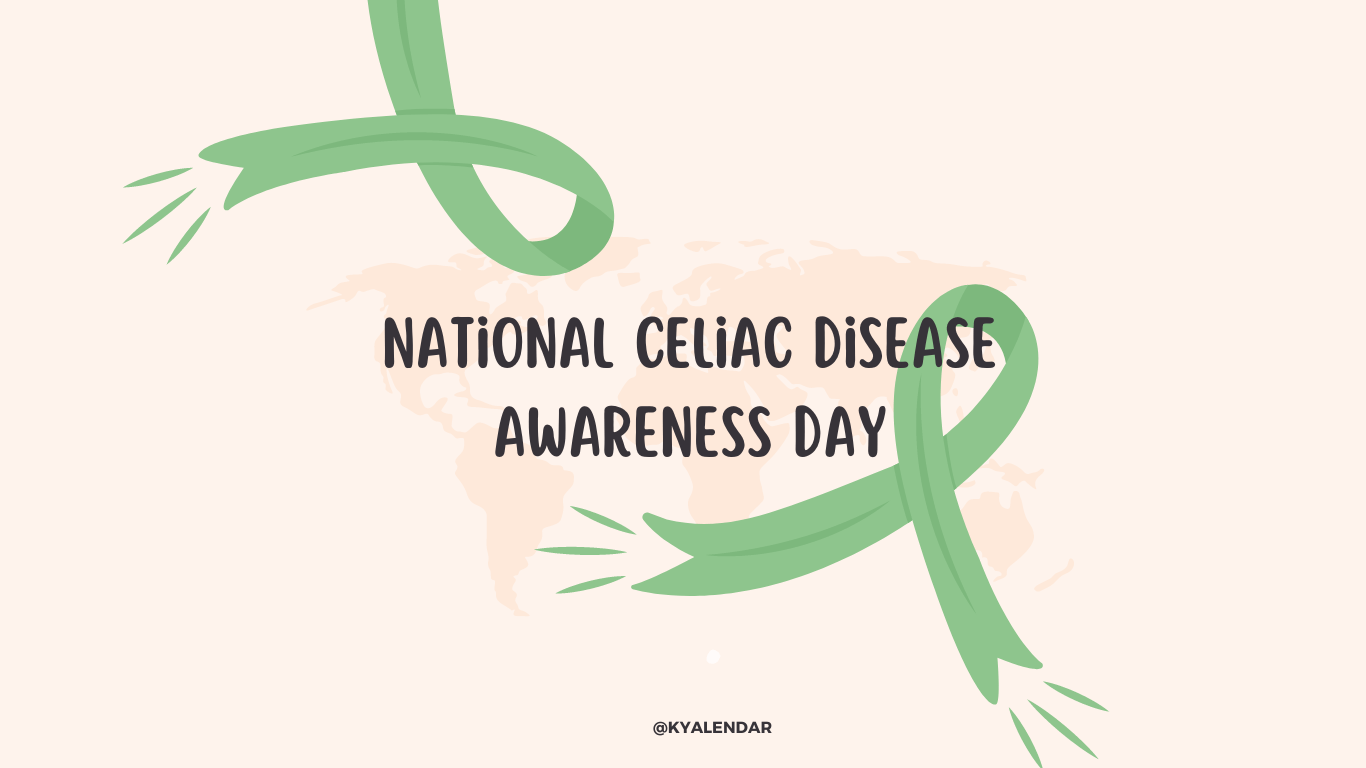
- This event has passed.
National Celiac Disease Awareness Day
September 13

National Celiac Disease Awareness Day, observed annually on 13th September, is a day dedicated to raising awareness about celiac disease, a serious autoimmune disorder affecting millions of people worldwide. This day serves as an opportunity to educate the public, support those living with the condition, and advocate for better diagnosis, treatment, and overall understanding of celiac disease.
Understanding Celiac Disease
Celiac disease is an autoimmune disorder where the ingestion of gluten—a protein found in wheat, barley, and rye—triggers an immune response that damages the small intestine. Over time, this damage hinders the body’s ability to absorb nutrients, leading to various health issues, including malnutrition, anaemia, and osteoporosis. For those with celiac disease, even a small amount of gluten can cause significant harm.
The symptoms of celiac disease can vary widely, making it a challenging condition to diagnose. Common symptoms include digestive problems like diarrhoea, bloating, and abdominal pain, as well as more general issues such as fatigue, weight loss, and skin rashes. In some cases, individuals with celiac disease may experience little to no symptoms, which can delay diagnosis and lead to complications.
The Importance of Awareness
National Celiac Disease Awareness Day aims to increase understanding of this often misunderstood condition. Awareness is crucial because many people with celiac disease go undiagnosed or are misdiagnosed with other conditions. It’s estimated that approximately 1 in 100 people worldwide have celiac disease, yet a significant number remain unaware of their condition.
Raising awareness helps in several ways:
- Improving Diagnosis Rates: By educating the public and healthcare professionals about the symptoms and risks of celiac disease, we can improve diagnosis rates. Early diagnosis is key to managing the condition and preventing long-term health complications.
- Encouraging Gluten-Free Choices: Awareness also promotes the availability of gluten-free options in restaurants, schools, and workplaces. As more people understand the necessity of a gluten-free diet for those with celiac disease, the demand for safe, gluten-free foods continues to grow, making it easier for individuals with the condition to maintain their health.
- Supporting Research: Increased awareness can also lead to more funding and support for research into celiac disease. Research is essential for developing better diagnostic tools, treatments, and potentially even a cure for this lifelong condition.
- Fostering Empathy and Understanding: For those living with celiac disease, navigating a world filled with gluten can be challenging. National Celiac Disease Awareness Day encourages empathy and understanding, helping friends, family, and colleagues support those who need to follow a strict gluten-free diet.
How to Observe National Celiac Disease Awareness Day
There are many ways to participate in National Celiac Disease Awareness Day, whether you’re directly affected by the condition or simply want to show your support.
- Educate Yourself and Others: Take the time to learn more about celiac disease and share that knowledge with others. Social media platforms, community events, and workplace discussions are all great ways to spread awareness.
- Support Gluten-Free Businesses: On this day, consider visiting or promoting gluten-free restaurants, bakeries, and food brands. Supporting these businesses not only helps those with celiac disease but also encourages the growth of the gluten-free food industry.
- Participate in Fundraising Events: Many organisations hold fundraising events or campaigns on National Celiac Disease Awareness Day to support research and advocacy efforts. Whether you participate in a charity walk, donate to a celiac disease foundation, or organise your own event, every contribution makes a difference.
- Advocate for Change: Use your voice to advocate for better labelling of gluten-containing foods, more gluten-free options in public spaces, and greater recognition of celiac disease within the healthcare system. Writing to local representatives or signing petitions can help drive change.
- Support Someone with Celiac Disease: If you know someone living with celiac disease, this day is a perfect opportunity to show your support. Whether it’s preparing a gluten-free meal, offering to help them navigate a tricky social situation involving food, or simply listening to their experiences, small acts of kindness can go a long way.
The Role of Healthcare Professionals
Healthcare professionals play a critical role in the diagnosis and management of celiac disease. On National Celiac Disease Awareness Day, it’s important to recognise the ongoing need for education and training in this area. General practitioners, dietitians, and specialists should stay informed about the latest research and best practices for managing celiac disease, ensuring they can provide the best possible care to their patients.
Additionally, healthcare providers can use this day to raise awareness within their communities, whether through informational sessions, distributing educational materials, or participating in local events.
Living with Celiac Disease
For those diagnosed with celiac disease, National Celiac Disease Awareness Day is a reminder that they are not alone. Living with celiac disease can be challenging, but with the right support and resources, it is entirely manageable. Maintaining a strict gluten-free diet is the only effective treatment, and while this requires vigilance and sometimes significant lifestyle changes, many people with celiac disease lead full, healthy lives.
Support groups, both online and in-person, can be invaluable resources for those newly diagnosed or struggling with the condition. These communities provide a space to share experiences, tips, and encouragement, helping individuals navigate the complexities of a gluten-free lifestyle.
Conclusion
National Celiac Disease Awareness Day is more than just a day of recognition; it’s a call to action. Whether you’re directly affected by celiac disease or simply want to support the cause, there are many ways to get involved. By raising awareness, we can improve the lives of those living with celiac disease, promote better diagnosis and treatment options, and foster a more inclusive and understanding world. So, on 13th September, take a moment to learn, share, and support—every effort counts in the fight against celiac disease.